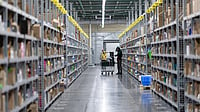
India’s ability to produce talent at scale has helped the country move beyond being just an offshore Delivery Centre, says STSPL CEO Pankaj Vyas.
STSPL like other GCCs was set up as an offshore development centre to leverage cost advantages.
It has continued investing heavily in India due to the strong availability of skilled talent.
India has been successfully able to produce talent at scale, which has made the country more than just a destination for back-office work or information technology (IT) work, according to Pankaj Vyas, CEO and Managing Director of Siemens Technology and Services Pvt Ltd (STSPL).
The company is the global capability centre of German technology conglomerate Siemens AG. In an exclusive interview with Outlook Business, Vyas explained that Siemens also set up STSPL as an "offshore development center because of the cost arbitrage."
However, over the years Siemens and others have stayed and made "a lot of investment" because of skilled workforce availability.
"STSPL has been around for a little more than 25 years now. The reason for coming to India was the same as every other GCC: to set up an offshore development centre. Offshore was the key, and offshore development centres emerged because of the cost arbitrage. The idea was to experiment, to see whether the same work could be done here...As this progressed, India successfully produced talent at scale," Vyas said.
He added that over time, across all GCCs and specifically at STSPL, a lot of investment went into developing leadership.
"The focus was on growing people in domain know-how, product know-how, and technology know-how. As a result, the depth and breadth of overall expertise kept improving. That’s how the organisation grew, not just in scale, but also in value," he said.
Siemens AG also has a Mumbai-listed subsidiary in India, Siemens Ltd, which was incorporated in 1957, with a wide portfolio of products and services including automation, power, and mobility solutions. Siemens Technology and Services Pvt Ltd is a separate entity.
"The focus of Siemens Technology and Services is different," explains the CEO. "It is the technology development arm that supports all Siemens AG businesses."
STSPL supports the conglomerate’s technology development needs via its three core pillars: Foundational Technology Development, Research, and Global Business Services. Foundational technology development provides hands-on development support for almost every Siemens product or solution across businesses. The research function focuses on corporate core technologies, working on future-oriented innovations that may influence the organisation “three to five years down the line.” Global Business Services delivers shared services across internal functions such as HR, finance, and inside sales.
The organisation has a little over 10,000 employees, with around 6,500 in foundational technology roles, while the rest support global business services. STSPL has centres in Bangalore, Chennai, Pune, Noida, and Gurgaon.
Vyas said that in the last five to six years, the GCC has added "more then 200 global roles."
"A significant portion of our hiring and growth has been in digitalisation areas, edge compute, cloud compute, cloud solutioning, cybersecurity, UX interfaces, AI, ML and more. A majority of our hiring has been in these digital skill sets," he said.
He added that the delivery centre has also put a "strong focus on training," which Vyas expects to have a "big impact going forward."
"We also have many people who already have deep domain know-how, and in our industries, technology alone isn’t enough. Understanding the domain and the context in which technology will be used is equally, if not more, important. So while we hire new talent with strong technology skills, we also invest heavily in training our existing domain experts in new technologies," the STSPL CEO further said.
STSPL is one of over 1,800 global capability centres in India, which employ 1.9 million professionals and generated $64.6 billion in export revenue in FY25, according to a report by TeamLease. The report states that the GCC sector is projected to add another 2.8–4 million jobs by FY30.
Experts earlier told Outlook Business that the recent hike in US H-1B visa fees by the Trump administration will further fuel global companies to set up offshore delivery centres in India.
Vyas believes that "eventually, any organisation will go where talent is available at scale."
He argues that any decision to get work done "onsite, offshore or nearshore" depends on three factors: "speed, cost and value."
"If I'm sitting in the US and have to wait too long to get someone on board, speed becomes a problem. If bringing people on certain visas becomes more expensive, that affects cost. And then there is quality, if an organisation is used to doing everything onshore with teams in the office, but now wants work done in places like India, then mature processes and proper governance structures are essential to ensure quality doesn’t suffer," the Siemens Technology and Services Chief explained.


































